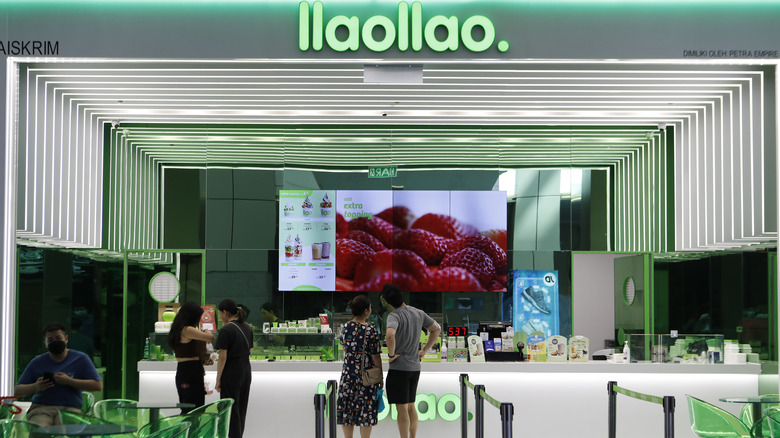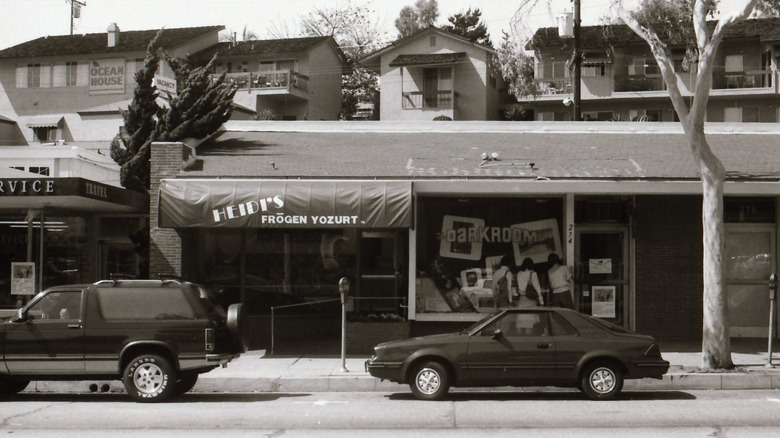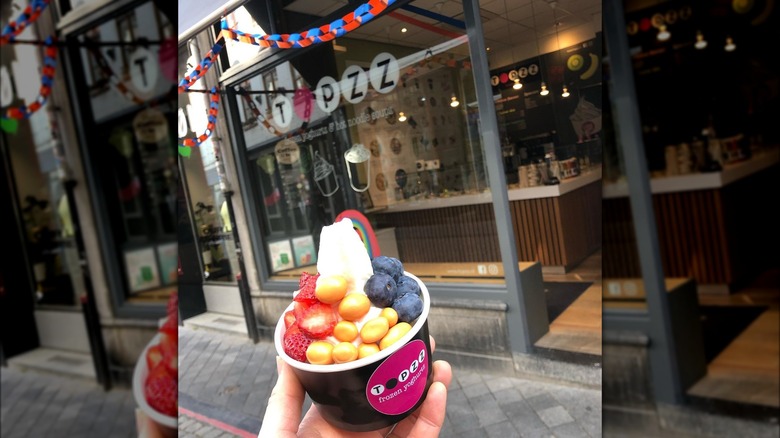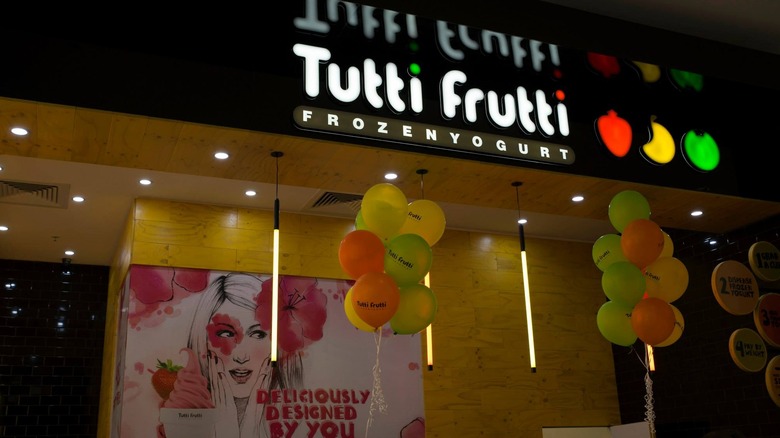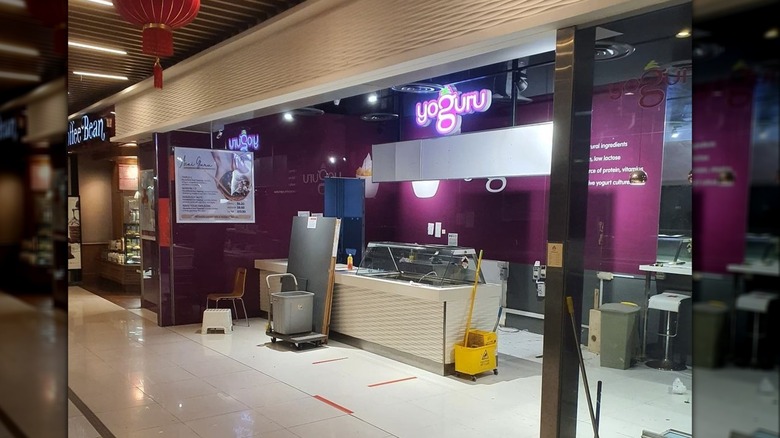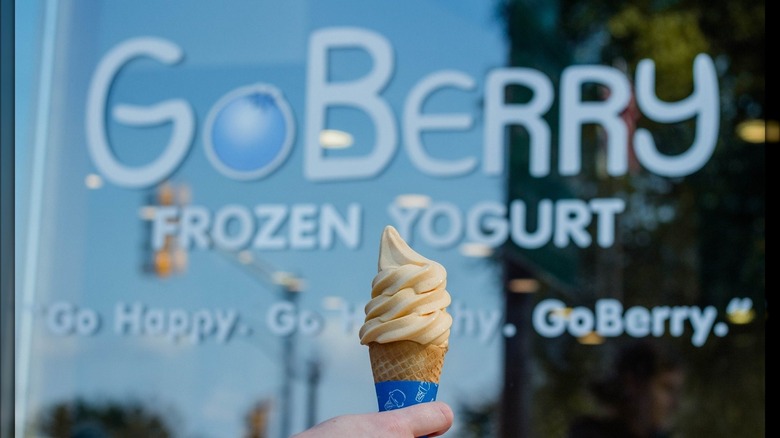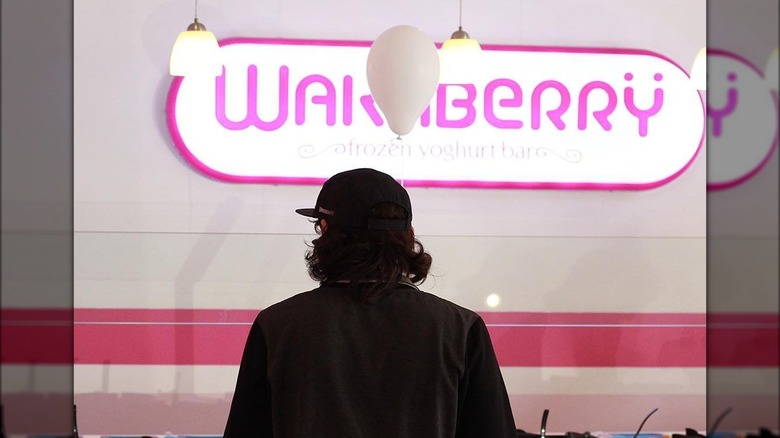7 Frozen Yogurt Chains That Just Disappeared
In the not-too-recent past, we couldn't get enough frozen yogurt. Froyo shops were suddenly popping up all over the place. However, the once-booming dessert trend, marked by the success of chains like Pinkberry, has dwindled over the years. There are many theories for this drop-off in interest. Some think that shifting diet preferences may have significantly influenced the initial attraction of froyo as a low-fat option. However, it started losing credibility as sugary toppings became more prevalent. Plus, the emergence of dairy-free and low-calorie ice cream alternatives in the supermarket may have further contributed to the dwindling appeal of traditional froyo.
Several prominent froyo chains, including Pinkberry and Menchie's, have experienced notable store closures, reflecting the industry's decline. The COVID-19 pandemic and associated supply chain issues only made things worse for many chains, yet many were having issues long before that. These 7 frozen yogurt chains just disappeared. Do you remember any of them?
1. Llaollao closed due to menu exhaustion
Frozen yogurt was not just popular in the United States but was once adored around the globe. Even so, franchises in other countries are also feeling the pinch. One of the first to go was Singapore's popular froyo spot, Llaollao. Instead, the brand changed nearly 30 of its locations to another brand, Yolé, almost overnight. The reasoning behind this was simple: Llaollao management simply couldn't come up with more flavor ideas. After a quick three-year stint on the scene, there was not any more room for menu creativity.
Critics of the move had doubts about whether the menu was the real problem. Many point out that the new flavors Yolé could bring to the table could have just as easily been launched under the original brand. While a few Yolé locations are still open in Singapore, Llaollao has also made a small comeback in the country, pending further success.
2. Heidi's Frōgen Yozurt faced bankruptcy
Heidi's Frōgen Yozurt was once a popular place for a sweet treat but ran into financial issues due to its quick expansion. Named for its co-founder Heidi Miller, this spot was a bit different from other froyo places in that it didn't offer candy as toppings. Instead, patrons could enjoy a simple cup of frozen yogurt without too much fanfare. The reasoning behind this was Miller, a popular bodybuilding competitor on the Laguna Beach circuit, believed in promoting a healthy lifestyle.
She co-founded the brand with businessman Brian Pallas in an Irvine, California, outlet mall in 1982. This makes it one of the earliest froyo chains in the country, quickly expanding to almost 100 locations by 1989. However, the dream didn't last. Much like many froyo stores that would come after it through the years, Heidi's Frōgen Yozurt eventually went into administration because it was spread too thin. There were bills to pay and problems with keeping up with franchise owners, so the chain collapsed and was bought out. None of the locations are open today.
3. Topzz closed due to increases in regulations and business costs
After 11 years in business, the popular Dutch frozen yogurt franchise Topzz had to shut its doors. In a translated Instagram post, the couple who own the restaurant shared that new environmental regulations in the Netherlands were hurting their bottom line. "The regulations are constantly changing: no more plastic spoons, straws, cups: that also causes cost increases and dissatisfaction with you as customers," they wrote. This comes on top of increased prices for the electricity to run the shop and the overall costs of supplies to make the treats, like yogurt and fruit. These increases in costs were not offset by an increased interest by customers, as the international froyo slump hit this business as well.
On top of all this, the post-COVID hospitality labor market found retaining casual staff difficult. "The tightness in the labor market is causing us to keep working ourselves 7 days a week: that's too much for us," the owners shared.
4. Tutti Frutti abandoned its online presence
Tutti Frutti used to be a popular frozen yogurt shop in the U.S., with locations across the country. However, one day, the franchises just suddenly disappeared. Even though the brand seems to still be active in Australia, its American presence is basically gone. This is confirmed by the locations that are still open on the Australian website. The Tutti Frutti Instagram page for U.S. stores has not made a post since June 2019, and a goodbye post is also noticeably absent from the social media account.
The website for the international brand, as linked on that account, is currently unable to be visited. This typically means whoever owns the website has failed to pay for its maintenance and let the domain name and hosting lapse. We can only assume Tutti Frutti corporate is mostly out of business in the U.S. and that this happened suddenly, given the lack of press about the event or explanation on social media.
5. Yoguru left the door open for the future
Another popular Singaporean froyo spot had to shut its doors but left a small bit of hope for fans that it might come back again if conditions are right. After 15 years in business, Yoguru closed down in January 2022. "Dear Valued Customers of Yoguru, as we close our shutters one final time today, we would like to thank each and every one of you for supporting us throughout all these years and also during this current pandemic. It has been an honor for us to be able to serve you all these 15 years and we thank you from our hearts," a statement published on Instagram read.
Although the store's specific reasons for going out of business were not stated, we can only assume that by mentioning the pandemic and the timing of the post what the cause was. The dip in business caused by more people staying home and the overall wane in interest in frozen yogurt as a treat likely contributed to its demise. "We're not sure when but we'll be back and we'll inform here first so do stay tuned to our page. Do Take care and be safe – Management of Yoguru," the statement finishes.
6. Go Berry couldn't keep up with the dip in traffic
Another locally-owned froyo shop fell victim to a dip in business in January 2022. Go Berry, in Northhampton, Massachusetts, typically relied on the steady stream of students from the nearby universities to keep the lights on. However, the longer classes stayed online, the sleepier the communities became, thus causing many stores to close up shop. Couple this with ongoing supply chain issues, and you have a recipe for disaster. "With deep gratitude and reflection we announce the closing of GoBerry Northampton. Our last day will be Sunday, January 23," the store posted on its Facebook page.
"We treasure the community we developed over the course of the past twelve years – the people we worked with, and the customers who made the store so special. Thank you for supporting our business, even on the most frigid winter days. Thank you for welcoming us as friends and members of this community. For us, GoBerry has always been about more than froyo, it has been about our love and commitment to this community." While the store's website is still up and running, it now simply reminds visitors that the shop is no longer doing business. We can only assume that eventually, the registration will lapse, and even this reminder will become a thing of the past.
7. Wakaberry has two locations left ... and counting
Wakaberry is a South African froyo chain that was very popular until one day, it just wasn't. What started as an owner-operated business eventually turned into a franchise model in 2012 — what some would consider the peak of the froyo craze. The chain kept growing throughout the country. There were even plans to expand outside South Africa, taking the brand global. Wakaberry was so popular that the South African government declared July 26, 2014, as National Frozen Yogurt Day.
However, all this came to a screeching halt as froyo became a less popular dessert option. As of 2022, only two Wakaberry locations are reportedly still operating in the country, with no international expansion ever taking place. It is only a matter of time before these two locations also close their doors, as the brand's website has been under maintenance for months with no updates. There have also been no posts on the Wakaberry social media accounts since 2019, despite there being no official closing down announcement.

